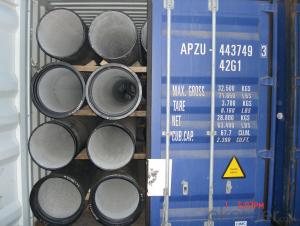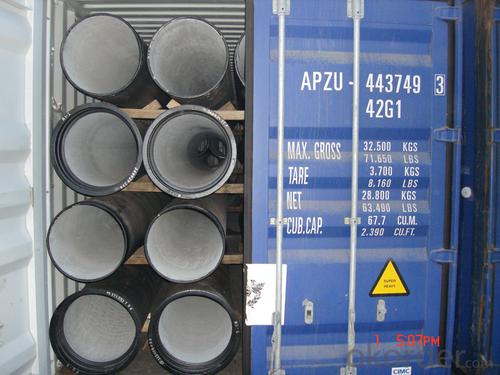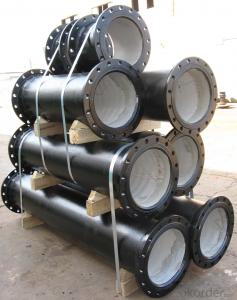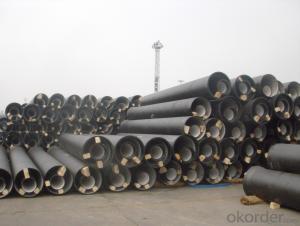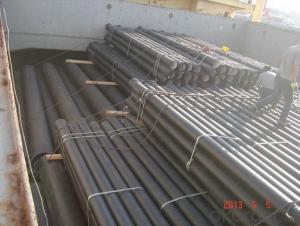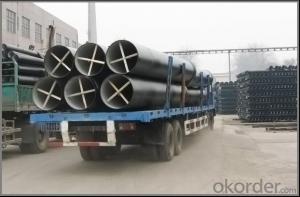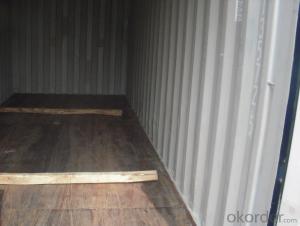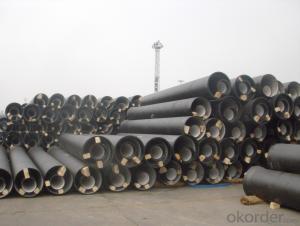DUCTILE IRON PIPES AND PIPE FITTINGS K8 CLASS DN550
- Loading Port:
- Tianjin
- Payment Terms:
- TT OR LC
- Min Order Qty:
- 22 pc
- Supply Capability:
- 3000 pc/month
OKorder Service Pledge
OKorder Financial Service
You Might Also Like
Material : Ductile Cast Iron
Size Range : DN 80mm to DN 2000mm
Unit Effective Length : 6m or 5.7m
Manufacture Standard: ISO 2531:1998/ EN 545:2006/EN 598:2007
Annual capacity : 200,000 tons
Coating Exterior: Zinc 130g/m2 according to ISO 8179-1 and bitumen coating 70 microns.
Cement Interior: Portland Cement/ High Alumina Cement/ Sulphate Resisting Cement Lining according to ISO 4179
Special requirements on external coating and internal lining can be applied
We also provide accessories such as SBR/EPDM rubber gaskets, lubricant paste, pipe caps, PE sleeves, etc.
Additional Parts:
Each pipe is strictly inspected according to related standard to ensure permanently high performance.
Easy Installation at site and service free for life
Long Service Lifespan
Quotation will arrive you within 24hours once we get your inquiry.
We guarantee offering you a competitive price.
A copy of original inspection reports of pipes will be offered after shipment.
Photos of loading process will be sent to the customer after shipment effect.
We will follow-up the delivery progress after shipment effect and update to the customer on weekly basis.
- Q: What is the average cost of ductile iron pipes?
- The average cost of ductile iron pipes can vary depending on various factors such as diameter, length, and location. On average, ductile iron pipes can range from $30 to $100 per linear foot. For example, a 6-inch diameter ductile iron pipe with a length of 20 feet may cost around $600 to $2,000. It's important to note that these prices are estimates and can change based on market conditions, project specifications, and supplier pricing. Therefore, it is recommended to consult with local suppliers or contractors to obtain accurate pricing information for specific projects.
- Q: How do ductile iron pipes handle pressure surges in pumping stations?
- Ductile iron pipes are specifically designed to handle pressure surges in pumping stations effectively. The inherent strength and flexibility of ductile iron make it well-suited to withstand the sudden increase in pressure that can occur during pump start-up or shutdown. One of the key features of ductile iron pipes is their ability to absorb and dissipate energy. When a pressure surge occurs, the ductile iron pipes have the capacity to absorb the excess pressure and distribute it evenly throughout the pipe network. This helps to minimize the impact of the surge and prevent any potential damage to the pipes or the pumping station. Additionally, ductile iron pipes have a high resistance to impact and stress, which further enhances their ability to handle pressure surges. The pipes are manufactured using a unique process that imparts strength and durability, allowing them to withstand the forces exerted during pressure fluctuations without any significant deformation or failure. Furthermore, ductile iron pipes have a smooth internal surface, which reduces friction and turbulence within the pipe network. This smooth flow characteristic helps to mitigate the effects of pressure surges by allowing the water to move efficiently without creating additional stress on the pipes. In summary, ductile iron pipes are specifically engineered to handle pressure surges in pumping stations by absorbing and dissipating the excess pressure, withstanding the impact and stress, and promoting smooth flow. Their robustness and reliability make them an ideal choice for applications where pressure fluctuations are common, ensuring the longevity and efficiency of the pumping infrastructure.
- Q: Can ductile iron pipes be used for railway bridges?
- Yes, ductile iron pipes can be used for railway bridges. Ductile iron is a type of strong and durable cast iron that has excellent tensile strength and flexibility. These properties make it suitable for various applications, including railway bridges. Ductile iron pipes can be used to construct railway bridge components such as supports, beams, and columns. They provide structural stability and can withstand heavy loads and vibrations associated with railway traffic. Additionally, ductile iron pipes are resistant to corrosion, which is crucial for railway bridges exposed to outdoor conditions. Therefore, ductile iron pipes are a viable option for railway bridge construction.
- Q: Does the cast iron pipe for spheroidal graphite need corrosion protection when laying underground?
- Ductile iron pipe is a kind of cast iron pipe.
- Q: What is the acceptance of cast iron pipe material?
- Specific acceptance, first of all in line with national standards, followed by the provisions of the contract, and then the project requirements. General contract and drawings will have the requirements and standards of pipe. I hope I can help you.
- Q: What is the maximum temperature that ductile iron pipe can handle?
- The maximum temperature that ductile iron pipe can handle depends on various factors such as the specific grade of ductile iron, the duration of exposure to high temperatures, and the presence of any external factors like corrosive environments. Generally, ductile iron pipes can handle temperatures up to 400-450 degrees Fahrenheit (204-232 degrees Celsius) for short durations. However, it is important to consult the manufacturer's specifications and guidelines to determine the specific maximum temperature limits for a particular grade of ductile iron pipe. Additionally, it is recommended to consider the effects of thermal expansion, potential loss of mechanical properties, and any additional protective measures that may be required at elevated temperatures.
- Q: If the ductile iron pipe is broken, can we use rush repair?
- These specifications are also based on the outer diameter of the tube. In daily life, we may also encounter a pipeline rupture, or when it is on the road to repair, excavator accidentally hit PE, PPR water supply and drainage pipeline, as long as a little, can be used to repair the pipeline repair section.
- Q: Can ductile iron pipe be used for agricultural irrigation systems?
- Yes, ductile iron pipe can be used for agricultural irrigation systems. Ductile iron pipe is known for its strength, durability, and corrosion resistance, making it suitable for various applications including agricultural irrigation. It can withstand high pressure and provide a reliable and long-lasting solution for transporting water in irrigation systems. Additionally, ductile iron pipe is resistant to chemicals commonly found in water sources used for irrigation, ensuring the pipe's integrity and preventing degradation over time. Its flexibility allows for easy installation and maintenance, making it a practical choice for agricultural irrigation systems.
- Q: How are ductile iron pipes protected against external impact or loading?
- Ductile iron pipes undergo various methods and measures to safeguard them against external impact or loading, guaranteeing their durability and integrity. Several common approaches are employed to protect ductile iron pipes, including: 1. Adequate Thickness and Strength: Ductile iron pipes are designed with ample wall thickness and high strength to withstand external loads and impacts. This design feature ensures that the pipes can endure heavy loads without deforming or cracking. 2. Implementation of Coatings: Ductile iron pipes are typically coated with protective layers to create an additional barrier against external impact. These coatings may comprise cement mortar lining, polyethylene encasement, or epoxy coatings. They not only grant impact resistance but also safeguard against corrosion. 3. Utilization of Proper Bedding and Backfilling Techniques: Proper techniques for bedding and backfilling are crucial in protecting ductile iron pipes from external loads. The correct placement of pipes within suitable materials, such as compacted granular bedding and backfill, helps distribute external loads evenly and minimizes the risk of pipe damage. 4. Consideration of Trench Design: The design of the trench in which ductile iron pipes are installed plays a vital role in safeguarding them against external impact. The dimensions of the trench, slope stability, and proper compaction of the backfill are all taken into account to reduce the likelihood of damage caused by external loads. 5. Implementation of Effective Pipe Layout and Support: Appropriate pipe layout and support are essential for protecting ductile iron pipes from external impact. Sufficient support mechanisms, including thrust blocks, pipe anchors, and pipe restraints, are utilized to absorb and distribute external loads, preventing any damage to the pipes. 6. Installation of Protective Structures: In areas where the risk of external impact is higher, additional protective structures are installed to safeguard ductile iron pipes. These structures may include concrete encasements, bollards, or reinforced concrete slabs, which act as physical barriers against potential impacts. In conclusion, a combination of factors, including pipe strength, coatings, proper installation techniques, and support measures, work together to ensure the protection of ductile iron pipes against external impact or loading. These measures enhance the longevity and reliability of the pipes, guaranteeing efficient performance in various applications.
- Q: Can ductile iron pipes be used for river crossings?
- Yes, ductile iron pipes can be used for river crossings. Ductile iron is a strong and durable material that is capable of withstanding the pressure and stress of being buried and crossed by a river. It is commonly used for various applications, including water and sewage systems, and has been proven to be reliable for river crossings. However, it is important to consider other factors such as the depth of the river, the size and weight of the pipes, and the installation process to ensure the proper design and installation of the ductile iron pipes for river crossings.
Send your message to us
DUCTILE IRON PIPES AND PIPE FITTINGS K8 CLASS DN550
- Loading Port:
- Tianjin
- Payment Terms:
- TT OR LC
- Min Order Qty:
- 22 pc
- Supply Capability:
- 3000 pc/month
OKorder Service Pledge
OKorder Financial Service
Similar products
Hot products
Hot Searches
Related keywords
